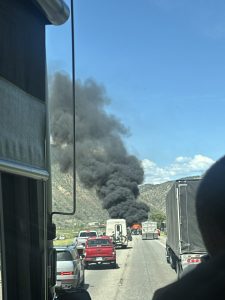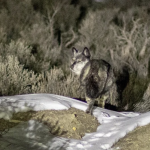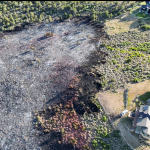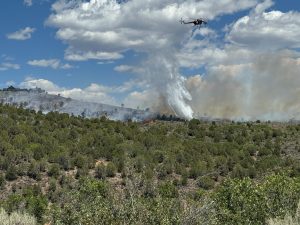An uncollared wolf is chronically killing livestock in Rio Blanco County, but the Elk Fire is preventing lethal action for now
The wolf was tied to three livestock attacks between July 20 and Aug. 2
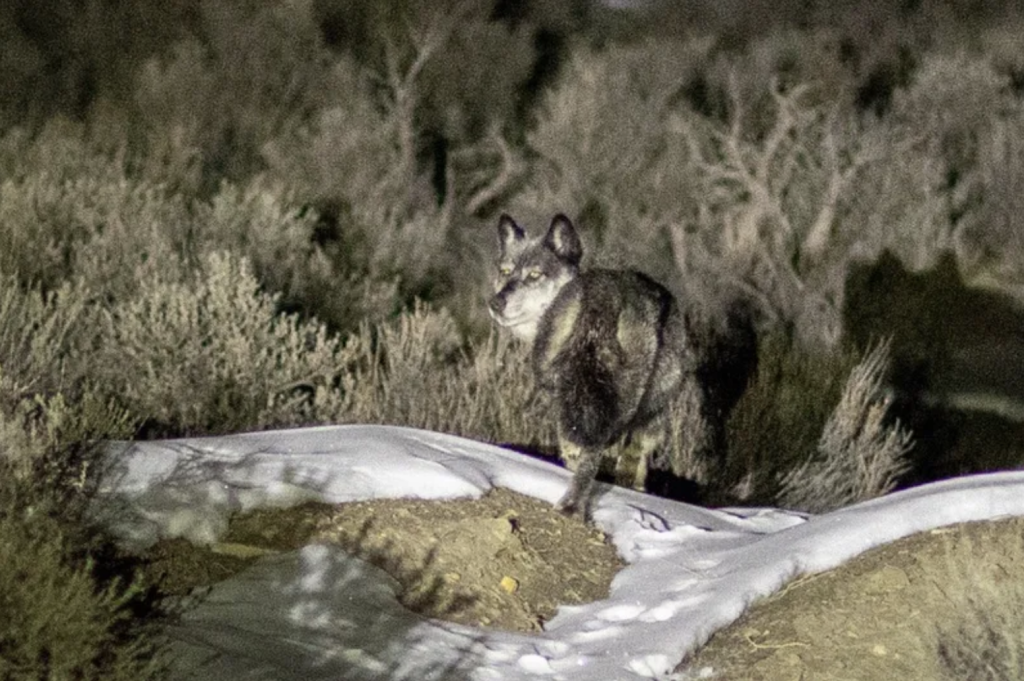
Colorado Parks and Wildlife/Courtesy Photo
An uncollared wolf has killed enough livestock in Rio Blanco County to meet Colorado Parks and Wildlife’s definition of chronic depredation, according to the agency.
However, while the circumstances merit the agency to kill the responsible animal, the Elk Fire — which grew to over 13,000 acres outside of Meeker on Monday night — is preventing Parks and Wildlife from taking lethal action yet.
In a news release on Tuesday, Parks and Wildlife confirmed that a wolf in Rio Blanco was connected to three livestock attacks — involving two lambs and one ewe — on July 20, July 22 and Aug. 2.
While one of Colorado’s three new wolf packs is located in Rio Blanco County — the Three Creeks Pack — the wildlife agency said an uncollared wolf was responsible for the attacks.
The incidents and evidence met Parks and Wildlife’s criteria for “chronic depredation,” which is defined as three or more depredation events in 30 days.
Following the first depredation by the wolf in July, Parks and Wildlife has been working with producers and woolgrower associations in the area to haze and prevent additional depredations. This includes “around the clock range rider coverage while opportunistically hazing the wolf” as well as conflict minimization tools recommended to the producer in their site assessment conducted earlier this year.
Parks and Wildlife’s chronic depredation management directive outlines that the agency can kill the responsible animal or animals in instances where wolves are chronically depredating, producers have attempted to minimize conflict with the wolves using a variety of non-lethal tools and if more depredations are likely.
“Under normal circumstances, this situation would warrant lethal removal operations in the area; however, the allotments where the depredations occurred are under evacuation due to the Elk Fire,” according to the agency’s news release. “(Colorado Parks and Wildlife) is continuing to monitor the situation in Rio Blanco County while coordinating with emergency services to prioritize human safety and minimize loss of livestock.”
This is the second time wolves have met Parks and Wildlife’s chronic depredation standard since the agency released the definition and management directive in December. The Copper Creek wolf pack was connected to a series of livestock attacks in Pitkin County in May. The frequency of attacks and use of nonlethal tools by producers met the definition of chronic depredation and merited Parks and Wildlife to kill one of the responsible yearlings.
Killing one of the depredating pack’s members is intended to alter the pack’s behavior, according to the directive. However, following the yearling’s death, producers have witnessed further harassment of livestock by the Copper Creek wolves, and in July, Parks and Wildlife confirmed a wolf in the pack was responsible for the death of a calf.
In an interview with the Vail Daily on Thursday, July 31, Jeff Davis, director of Parks and Wildlife, said that the depredation, as well as the information the agency was hearing and seeing from producers and videos, was concerning.
“It tells us that we have not altered the pack’s behavior from pursuing livestock on a regular basis,” Davis said. “So, we have more work to do.”
Starting July 20, the agency deployed staff in Pitkin County to try and local and kill another member of the pack. While staff have been searching since then, they have been unable to find the responsible wolf as of yet.
On Monday, Luke Perkins, a public information officer for Parks and Wildlife, confirmed to the Vail Daily that agency staff are “still in an active removal period.”
“As this is a sensitive and ongoing operation, we will not be providing further details until operations cease and a final report is issued,” Perkins added.

Support Local Journalism

Support Local Journalism
Readers around Glenwood Springs and Garfield County make the Post Independent’s work possible. Your financial contribution supports our efforts to deliver quality, locally relevant journalism.
Now more than ever, your support is critical to help us keep our community informed about the evolving coronavirus pandemic and the impact it is having locally. Every contribution, however large or small, will make a difference.
Each donation will be used exclusively for the development and creation of increased news coverage.

